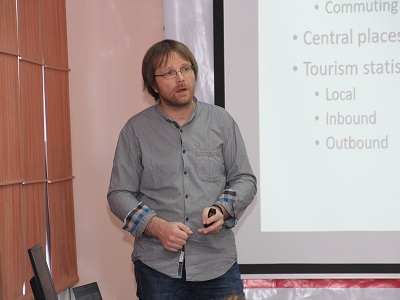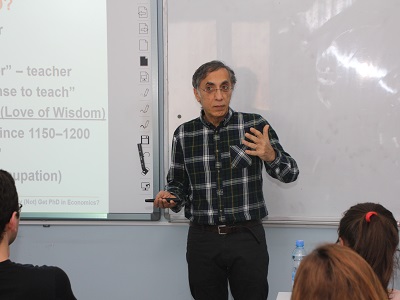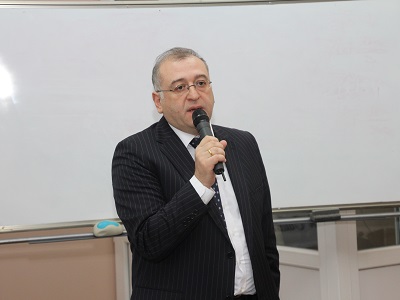On Wednesday March 27, ISET hosted Dr. Anto Aasa, a Research Fellow in Human Geography from the University of Tartu, who delivered a seminar to ISET’s BA and MA students entitled ‘Use of mobile positioning data in mobility studies’.
During the seminar, Dr. Aasa introduced a research project conducted by the Research Group in Mobility Studies at Tartu University. They used Information & Communication Technology (ICT)-based services to analyze different societal processes. Among other ICT-based datasets, the CDR (Call Detail Record) data consists of log-files collected by mobile network operators to monitor and keep track of billable calling services used by their clients. The dataset contains information about the phone call initiator (the unique and anonymous ID), time of calling activities, as well as the location of the mobile antenna where the call activity was made. This kind of data shows the respondent’s social background (gender, age and language) and other secondary characteristics, such as anchors (ie home/work environments) and transport demand. This is widely used in tourism statistics in local, inbound, outbound levels.
“You need to think carefully before you jump into this deep sea,” said Professor Daniel Levy at the very beginning of a presentation entitled “PhD Studies - Who Is It for?”. While this statement sounded frightening to those who were planning to pursue a PhD or other further studies, it appeared to be more bemusing for others who were not considering a career in academia.
Based on his personal experience, Dr. Levy explained that substantial difficulties come with academic life: a PhD is not a continuation of an MA, and it constitutes an “unbelievable amount of commitment”. It requires “focus, and lots of patience, time and energy”. Dr Levy recalled that during his studies, he took most of his meals sitting in front of a computer or with his nose buried in a book.
On Wednesday January 23, ISET hosted the Governor of the National Bank of Georgia (NBG), Mr. Koba Gvenetadze. Mr. Gvenetadze delivered a profoundly informative lecture about the importance of monetary policies for economic well-being, discussing issues such as the importance of the price stability objective, inflation targeting frameworks (specifically why it is so crucial to avoid both deflation and high inflation), and the efficiency of monetary policy transmission mechanisms under a flexible exchange rate.
Since Milton Friedman, in his Presidential Address to the American Economic Association, presented a clear description of the role of monetary policies, economists (theorists and policymakers) have concentrated on studying the importance of price stability as a primary objective of monetary policies, and designing an optimal policy to achieve it. The economic costs of high and unstable inflation can be enormous. First, high inflation creates uncertainty in prices and distorts price signals, which leads to the inefficient allocation of scarce resources. Secondly, uncertainty related to high and volatile inflation complicates long-term planning, which forces businesses to invest in short-term projects, instead of investing in more productive long-term activities. Thirdly, lower inflation reduces interest rates and contributes to financial stability. However, moderate inflation is a result of economic growth.













